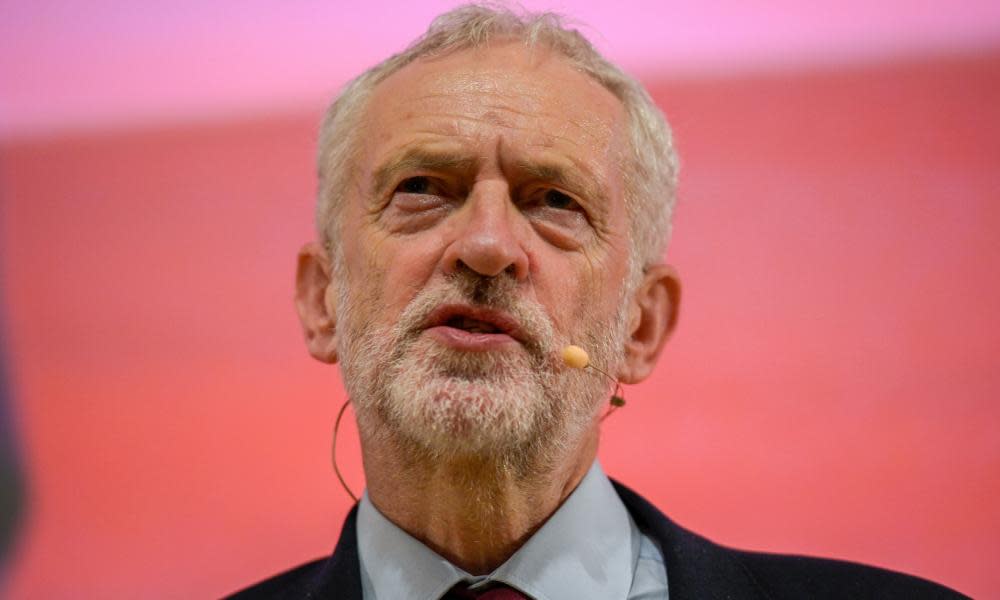Foreign Office denies state funds went to Twitter account criticising Labour

The Foreign Office minister Alan Duncan has denied that any of the £2m of government funding given to a Scottish-based company meant to counter online Russian propaganda went towards the company’s Twitter account which also spread unfavourable views about Jeremy Corbyn and the Labour party.
On Monday, Duncan had promised an investigation into the use of government funds by the Integrity Initiative, a project run by the Fife-based Institute for Statecraft, after the Sunday Mail revealed its Twitter account had been used to attack Labour.
But in the face of anger from the opposition benches, Duncan said he had “established the facts” around the controversial counter-disinformation campaign, and was “satisfied that our money does not go towards funding any kind of UK domestic activity”.
The paper cited one Integrity Initiative tweet quoting a newspaper article labelling Corbyn, the Labour leader, a “useful idiot” for Moscow. Its account also shared a Sunday Times article accusing Seumas Milne, Corbyn’s communications chief, of “wittingly or unwittingly” advancing the Kremlin’s agenda.
FCO funding of the Integrity Initiative was revealed by a set of stolen documents posted online last month by hackers under the banner of the Anonymous hacktivist collective. The organisation has not disputed their authenticity, but in a statement suggested that Russia was responsible for the hack and that Moscow had used its media channels to amplify its impact.
Duncan, responding to an urgent question by Emily Thornberry in the Commons on Wednesday, insisted that government funding only covered the Integrity Initiative’s activities “outside the UK and it does not fund any activity within the UK; nor does it fund the management of the Integrity Initiative’s social media account”.
Duncan said that the leak itself, and media reports arising from it, “fits with a wider pattern of Russian disinformation against the UK” that appeared to be aimed at discrediting an organisation that was working to expose such propaganda.
Insisting that the government had written assurances that official funds would not be used in attempts to influence domestic politics, he added: “It saddens and dismays me that I do not have the full support of those on the opposition frontbench in defending what we are doing.”
Later, Thornberry posted on Twitter an open letter to Duncan citing key passages from the leaked Integrity Initiative documents that appeared to contradict his claims.
He insisted that the FCO funding did not support the Integrity Initiative's Twitter operation, which raises some interesting questions. See my letter this evening demanding answers (2/2). pic.twitter.com/rDetljvA74
— Emily Thornberry (@EmilyThornberry) December 12, 2018
Among them was a project proposal form completed as part of its application for FCO cash that described its social media activity as “one of the most important means for countering Russian disinformation”, and promised it would use it to “distribute our own material and good work done by others”. Thornberry noted these activities would be funded to the tune of £257,311, of the total £1,961,000 applied for by the organisation – and which was granted in full.
She asked Duncan to reveal any changes to the final documentation that excluded Integrity Initiative’s Twitter account from official funds and, if such an amendment to the agreement existed, why it was that the cost had not been deducted from the FCO’s funding for the organisation. Finally, she asked Duncan to guarantee that no part of the salary of the person responsible for the Twitter account was paid out of official funds.
David Miller, professor of political sociology at the University of Bristol and director of Spinwatch, said the government’s responses were inadequate.
“The Integrity Initiative and the Foreign Office are effectively admitting that they are being accused of doing something wrong, so they haven’t got anywhere to go,” he said. “So they are saying it’s nothing to do with us.”

 Yahoo News
Yahoo News 
